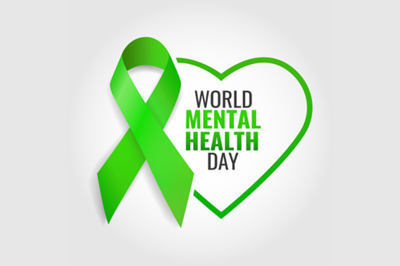Wellness & Beyond
Time for a Mental Health Checkup
October 10, 2023

In the fast-paced world of law, it is easy to get caught up in the daily grind and neglect our well-being. In honor of World Mental Health Day, October 10, let us take a moment to check in on our mental health.
Before diving into a check-in, it can be helpful to quiet down your stress response. So, please take a deep breath. Breathe in for four counts, hold for seven, and release the breath through your mouth for eight counts. You just did the 4-7-8 breathing technique, activated your parasympathetic nervous system, and created some space to proceed.
Here are five questions you can ask yourself to assess your mental well-being:
1. How am I feeling mentally and physically right now?
Stop. Take a deep breath. Observe any feelings that come up. Are you noticing stress, anxiety, worry, sadness, or other challenging emotions? Use a scale from 1 to 10 and note how you feel. Keeping track of this number and seeing how it changes can help track your well-being.
Pay attention to any physical discomfort you may be experiencing. Are you noticing any headaches, pains, muscle tension, or stomachaches? Mental health can manifest physically and can often be more noticeable than emotions.
2. Am I providing my body with its basic needs?
Sometimes we get so busy that we forget to focus on the basics that are foundational to our physical and mental health. When your body doesn’t have the food, water, or rest/movement it needs, it sends signals to the brain that heighten feelings of nervousness and stress and make it harder to regulate emotional states.
Reflect on your recent patterns of eating, sleeping, and movement. Ask yourself these questions: (1) When was the last time I drank water or ate? (2) Am I tired? Did I get enough sleep? (3) Have I moved my body today in a way that is accessible to me?
If you notice your self-care has slipped, it can be a sign of a mental health concern. Changes in sleep or appetite may signal anxiety or depression.
3. When was the last time I connected with people?
Social connection is vital to mental health. A simple conversation can have a significant impact. Consider whether you have been reaching out to friends or family to maintain relationships.
4. What is occupying my mental space?
Are you noticing that you think about one or two (or eight or nine things) repeatedly? Are the thoughts productive, or are they causing challenging feelings? Are they impacting your ability to concentrate and focus on tasks? Identifying the triggers behind our feelings can allow us to take steps to address them and improve our mental health.
If you are having trouble identifying what is taking up all that space, here are a few strategies to try:
- Journaling. Writing down your thoughts and feelings can help identify patterns, triggers, and concerns. It can help gain deeper insight into thoughts, behaviors, and motivations. Journaling also externalizes your worries onto paper, reducing their emotional impact.
- Mindfully meditating. By observing your thoughts without judgment, you can notice what preoccupies your mind and learn to let go of unhelpful rumination.
- Talking to someone. Simply articulating your thoughts out loud can help you understand what is taking up mental space and even, at times, turn down the intensity or frequency of thoughts.
5. Am I practicing self-compassion?
Research shows that self-compassion improves well-being and lowers anxiety, depression, and stress. Assess whether you are treating yourself with kindness and understanding or being highly critical of yourself. Are you talking to yourself like you would a friend? Are you able to challenge negative self-talk and replace it with encouragement and compassion?
After answering these questions, taking action based on your self-assessment is vital. Think about one or two small steps you can take to meet your mental health needs.
If this checkup was helpful, consider dedicating a few minutes each week (or even better, each day) to check in with yourself. You can pair it with an already-established habit, such as brushing your teeth, making (or buying) your lunch, or commuting home.
Remember, mental health is an ongoing journey with many ups and downs. It is normal to have periods of stress or low mood. However, consistently feeling overwhelmed, anxious, irritable, or sad may indicate a need for additional support. Don’t hesitate to seek help; the Lawyer Assistance Program is here.
If you want to take an online screening, Mental Health America offers a variety of mental health tests to screen for symptoms and provide information and resources.
Niki Irish, LICSW, is the outreach and education coordinator of the D.C. Bar Lawyer Assistance Program.


